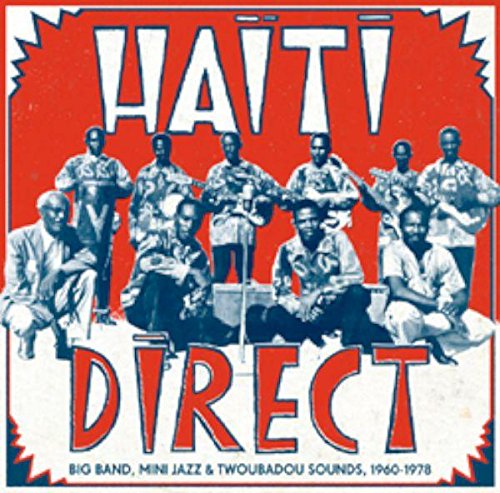
Various Artists
Haiti Direct: Big Band, Mini Jazz & Twoubadou Sounds, 1960-1978
Release Date: Jan 28, 2014
Genre(s): International
Record label: Strut
Music Critic Score
How the Music Critic Score works
Buy Haiti Direct: Big Band, Mini Jazz & Twoubadou Sounds, 1960-1978 from Amazon
Album Review: Haiti Direct: Big Band, Mini Jazz & Twoubadou Sounds, 1960-1978 by Various Artists
Exceptionally Good, Based on 5 Critics
Based on rating 9/10
Compiled by Sofrito's Hugo Mendez, Haiti Direct is an amazing collection from Haiti's illustrious but sadly unsung musical history. While the island is still synonymous to too many with violence, poverty and voudou stereotypes, the island has a vibrant and innovative musical scene evolving from Compas Direct (meaning direct beat and itself a slower variant of Dominican merengue that came to prominence in the mid-1950s), which bred offshoots like the horn-driven Cadence Rampa, Mini-Jazz, which trimmed down the traditional big-band sound with rock instrumentation and psychedelic touches. The rural twoubadou style, meanwhile, is rooted in the Son and Guaracha brought from migrant Cuban workers.
Based on rating 8/10
Haitians have been making lemonade out of lemons since at least 1804. In that year, they were the first nation on Earth to officially rise up and toss their French colonial slave masters kicking and screaming back to the old world, scaring the piss out of white slaveholders across the Americas in the process. Since that time, Haitian culture has developed into one of richest and most vibrant expressions of humanity in the world.
Based on rating 4/5
Considering its influence on music throughout the Caribbean and South America, it seems remarkable that this new compilation is the first in-depth look at Haiti’s golden age of the 60s and 70s. Making up for lost time, Strut have produced a collection that’s broad in scope, detailed in its sleevenotes and packed with a raft of outstanding music. Supported by the notorious Papa Doc Duvalier, Haiti’s music scene began to flourish in the late 50s.
Opinion: Fantastic
Few nations have experienced as much turmoil as Haiti, yet fewer nations have as rich and diverse an assemblage of cultures in their heritage. The Creole language and voodoo (henceforth to be written as the more correct vodou) practices are all mixes of West African, European and Taino (the now extinct pre-colonial Haitian natives) traditions, woven into a new, distinctly Haitian culture all its own. Also salient to this particular set of music - and modern Haiti in general - are the oppressive dictatorships that blighted the latter half of the twentieth century.
Opinion: Excellent
Whether she’s playing a lone lo-fi guitar or fronting her Velvets-rooted studio band, whether she’s singing as if only to herself or opening up with hints of torchy sorrow, Angel Olsen aims to keep things blunt and essential on her second album, “Burn Your Fire for No Witness” (Jagjaguwar). “Everything is tragic, it all just falls apart/but when I look into your eyes it pieces up my heart,” she sings in a kind of existential lullaby, “White Fire. ” “If I only had an answer to put it all to bed/I wish sometimes I could take back every word I’ve said.
'Haiti Direct: Big Band, Mini Jazz & Twoubadou Sounds, 1960-1978'
is available now

